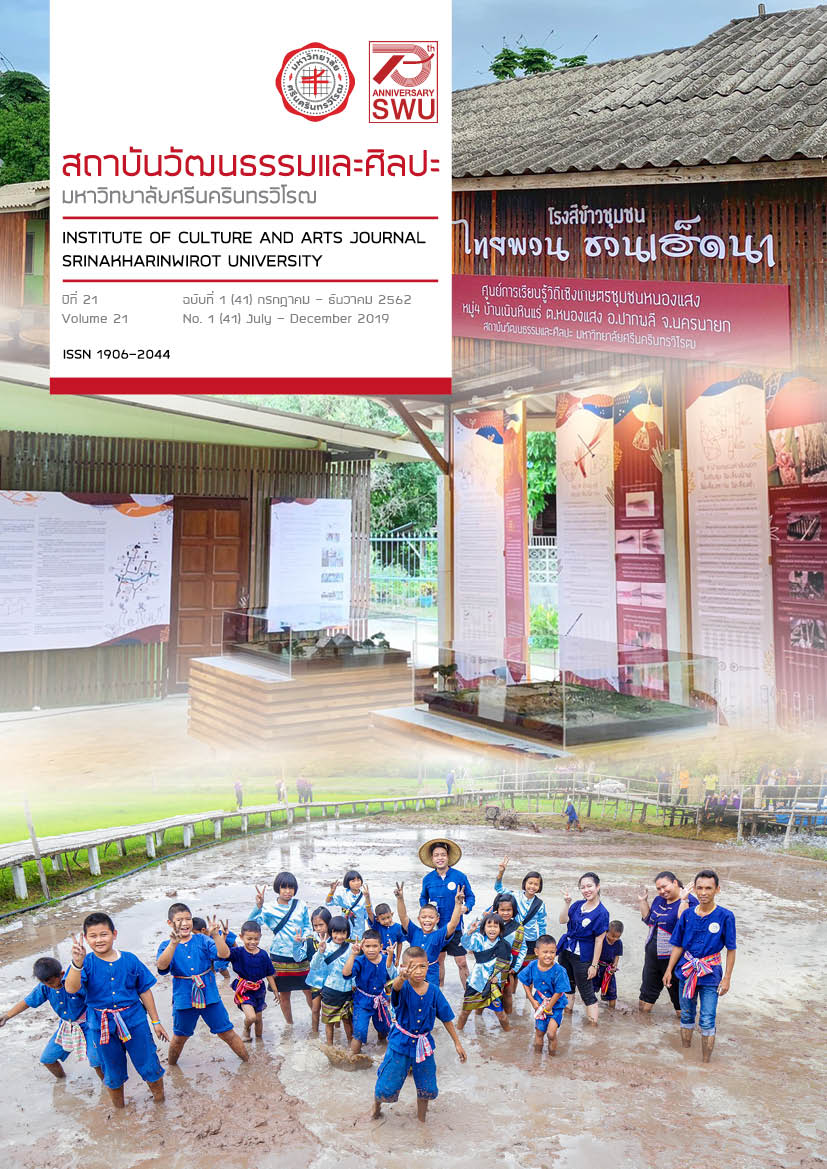The Study In Learning Outcomes In Theory Of Harmony Through Cooperative Learning For Bachelor’s Degree Students In Music, The Faculty Of Fine Arts, Srinakharinwirot University
Keywords:
cooperative learning, learning outcomes, satisfaction, theory of harmonyAbstract
This research is quasi – experimental Research using research design developed from One – Group Pretest – Posttest Design aimed to examine the effect of students’ learning outcomes in Theory of Harmony through the cooperative learning and to study students’ satisfaction toward the cooperative learning in Theory Harmony Subject. The sample was 15 Bachelor’s students in Music, the Faculty of Fine Art, Srinakharinwirot University who enrolled in Theory of Harmony I Subject in the first semester of the academic year 2559. The research tools included the experimental tool including the Cooperative Learning Lesson Plan in Theory of Harmony; and the data-collecting tools consisting of the Achievement in Theory of Harmony test; the Retention test; the Behaviour of group work Evaluation form; and the Satisfaction toward the cooperative learning in Theory of Harmony test. The tools had the reliability coefficient of 0.81, 0.83, 0.87 and 0.89 respectively. The results derived from the data are calculated using a simple descriptive statistical analysis and also statistical analysis of the t-test for Dependent Sample and the t-test for One–Sample, using SPSS Statistics 22.0.
The findings were 1) the students taking the cooperative learning significantly increased their learning achievement in Theory of Harmony both individual and overall; 2) the students taking the cooperative learning showed their learning achievement at a moderate level; 3) students’ learning achievement in Theory of Harmony after taking the cooperative learning and their learning achievement four weeks after taking the cooperative learning showed similar scores, indicating their learning retention; 4) the students taking the cooperative learning showed their good behaviour of group work; and 5) the students significantly increased their satisfaction displayed more positive characteristics toward the cooperative learning in Theory of Harmony.
Downloads
References
พิมพ์แห่งจุฬาลงกรณ์มหาวิทยาลัย.
ณรุทธ์ สุทธจิตต์. (2555). ดนตรีศึกษา: หลักการและสาระสำคัญ. พิมพ์ครั้งที่ 9. กรุงเทพฯ: สำนักพิมพ์แห่งจุฬาลงกรณ์มหาวิทยาลัย.
ประพันธ์ศักดิ์ พุ่มอินทร์. (2557). การศึกษาเพื่อสร้างชุดการสอนคีย์บอร์ดเบื้องต้นโดยใช้วิธีการของโคดาย. วารสารสถาบันวัฒนธรรม
และศิลปะ มหาวิทยาลัยศรีนครินทรวิโรฒ. ปีที่ 16 ฉบับที่ 1(31) กรกฎาคม-ธันวาคม. หน้า 68-79.
ผ่องพรรณ ตรัยมงคลกูล และ สุภาพ ฉัตราภรณ์. (2543). การออกแบบการวิจัย. กรุงเทพฯ: สำนักพิมพ์มหาวิทยาลัยเกษตรศาสตร์.
วรรณทิพา รอดแรงค้า. (2540). Constructivism. กรุงเทพฯ: คณะศึกษาศาสตร์มหาวิทยาลัยเกษตรศาสตร์.
ศุภศิริ โสมาเกตุ. (2544). การเปรียบเทียบผลสัมฤทธิ์ในการเรียนและความพึงพอใจในการเรียนภาษาอังกฤษ ของนักเรียนชั้นประถม
ศึกษาปีที่ 5 ระหว่างการเรียนรู้โดยโครงงานกับการเรียนรู้ตามคู่มือครู. วิทยานิพนธ์. กศ.ม.(หลักสูตรและการสอน). มหาสารคาม:
บัณฑิตวิทยาลัย มหาวิทยาลัยมหาสารคาม. สืบค้นเมื่อ 20 มกราคม 2561, จาก http://newtdc.thailis.or.th/
สุมณฑา พรหมบุญ. (2541). การเรียนรู้แบบมีส่วนร่วม: การปฏิรูปการเรียนรู้ตามแนวคิด 5 ทฤษฎี. กรุงเทพฯ: โอเดียนสแคว์.
Colwell, R.J. & Wing, L. (2004). An Orientation to Music Education: Structural Knowledge for Music Teaching. USA:
Prentice Hall.
Johnson, R.T. & Johnson, D.W. (1994). An Overview of Cooperative Learning. In J.S. Thousand, R.A. Villa & A.I. Nevin
(Ed.). Creativity and Collaborative Learning. 31-34. Baltimore: Paul H. Brookes Publishing.
Johnson, D.W. Johnson, R.T. & Smith, K.A. (2009). Cooperative Learning: Improving University Instruction by Basing
Practice on Validated Theory. Journal on Excellence in University Teaching. Vol.25 No.3-4. pp.85-118.
Kostka, S. & Payne, D. (2009). Tonal Harmony with an Introduction to Twentieth-Century Music. New York: McGraw-Hill
Higher Education.
Leonhard, C. & House, W.H. (1972). Foundations and Principles of Music Education. USA: McGrew-Hill Book.
Millis, B.J. & Cottell, P.G. (1998). Cooperative Learning for Higher Education Faculty. USA: American Council on
Education on Oryx Press.
Slavin, R.E. (1995). Cooperative Learning. Boston: Allyn and Bacon.
Downloads
Published
How to Cite
Issue
Section
License
บทความทุกบทความที่ได้รับการตีพิมพ์ถือเป็นลิขสิทธิ์ของวารสารสถาบันวัฒนธรรมและศิลปะ มหาวิทยาลัยศรีนครินทรวิโรฒ



